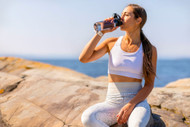Better Hydration: Water, Sports Drinks, or Energy Drinks?
Posted by Joel Pelina on May 11th 2022
When you are outside and active – exercising, playing sports, or just enjoying a walk or hike – it is important to stay hydrated, to replenish the fluids lost through physical activity. This is even more important when the weather is hot and sunny, as the increased heat will cause increased perspiration, making you lose hydration much more quickly. But which form of hydration is the best for you: water, sports drinks, or energy drinks?
First, let’s review why it is so important to maintain proper hydration during exercise. Because the human body consists of 60% water on average, hydration is essential to the operation of the vast majority of organs and body processes. Your heart, lungs, and muscles are especially dependent on proper hydration to work effectively during exercise. When you aredehydrated, you can become fatigued and lightheaded, and your muscles can become more prone to spasms or cramps. If you remain dehydrated after a period of heightened physical activity, your muscles are more likely to experience pain, stiffness, or swelling. Without enough hydration, your circulatory system can be subject to both increased or decreased blood pressure, leading to weakness, nausea, or even fainting. Because of this, proper hydration is essential before, during, and after any period of exercise.
运动饮料nd Hydration
Sports drinks are one of the most popular beverages when playing sports or exercising. They come in a variety of flavors and eye-catching colors, and are often promoted as the best drinking option for athletes. What separates them from drinking water when it comes to hydration?

The typical sports drink contains water, carbohydrates, electrolytes, and sometimes amino acids.
- Water: The base fluid of a sports drink, offering pure hydration.
- Carbohydrates: In the form of sugar or a glucose derivative to provide fuel for your body.
- Electrolytes: In the form of sodium, potassium, or magnesium, these help maintain the fluid balance in your body and the operation of electrochemical processes in your cells and organs.
- Amino acids: When present, they are used to promote muscle recovery.
At first glance, it appears as a list of all beneficial ingredients. But the issue with sports drinks is that they are designed to be optimal for intense physical activity, as generally experienced by professional, semi-professional, or amateur athletes. Sports drinks are designed for extreme physical activity in relatively short periods of time, where the strenuous muscle activity can benefit from the added carbohydrates, electrolytes, and amino acids to promote maintenance and prevent cramps or spasms. For the average person jogging or hiking on a sunny day, the added ingredients in sports drinks instead become additional calories and minerals with a much lower necessity or effect on the body. For many sports drinks, the excessive amount of added sugar increases the caloric intake to the point it offsets the benefits of casual exercise activity.
Energy Drinks and Hydration
Energy drinks are specialized beverages not promoted for hydration benefits, but instead for their purported ability to boost energy and alertness. They do this through the addition of high amounts of sugar, caffeine, and additional chemical additives such as guarana or taurine.

- Sugar: In energy drinks, sugar provides a quick, intense burst of energy that can rapidly fade and cause fatigue, resulting in what is generally called a “sugar crash.” It also adds a vast amount of calories to the drink.
- 咖啡因:促进提高警觉性和和谐ration, although excessive amounts of caffeine can also cause nervousness or jitters. Caffeine has a diuretic effect, and therefore can be a cause of dehydration.
- Added chemicals: Energy drinks can greatly vary in their chemical additives, with varying effects. Guarana is commonly used as an additional source of caffeine. Taurine is an amino acid that works as an antioxidant, but whose effects in energy drinks are debatable. B vitamins are often added to promote the conversion of carbohydrates into energy.
While energy drinks can promote increased energy or alertness, due to the effects of sugar and caffeine, hydration is not a factor when it comes to their composition, and the high levels of caffeine can dehydrate through an increased need for urination.
Water and Hydration
Water is synonymous with hydration. It is anessential body element, and used throughout the body for proper maintenance and operation. As such, when it comes to being active, water is a quick and easy way to rehydrate, with no additives or additional calories. Multipure water is an even better option, as it provides water that is treated for a broad array of potentially harmful contaminants, improving its taste, appearance, and healthfulness.
Cost Comparison
- Sports drink: $1.40 per liter, equal to $5.31 per gallon
- Energy drink: $2.00 per 16 oz, equal to $16 per gallon
- Multipure water: $90 per 750 gallons, equal to $0.12 per gallon
When it comes to hydration and active lifestyles, water offers the best hydration at the best price. It is affordable, available at your kitchen sink, portable with a reusable water bottle, and free from unnecessary additives. While energy drinks may promote increased concentration, alertness, and energy, they come at a very high monetary cost (13,333% higher than Multipure water) and with no consideration for actual hydration. Sports drinks offer additives that can be beneficial for high levels of athletic performance, but can be unnecessary or excessive for non-athletes; at a price that is 4,425% higher than Multipure water, its cost does not justify its benefits. When it comes to exercise and general physical activity, Multipure remains the best option for healthy hydration. For Life. For You.
References
- 1.“Know Your Ingredients.” Americanbeverage.org. Last accessed May 10, 2022.https://www.energydrinkinformation.com/get-the-facts/know-your-ingredients/
- 2.Leal, Darla. “6 Reasons Why You Should Drink Plenty of Water.” Verywell Fit. July 21, 2021.https://www.verywellfit.com/bottoms-up-for-water-3121378
- 3.Skerrett, Patrick. “Trade sports drinks for water.” Harvard Health Publishing. July 30, 2012.https://www.health.harvard.edu/blog/trade-sports-drinks-for-water-201207305079
- “Water vs. Sports Drinks: What’s Best for Our Bodies.” LiveWell. August 10, 2017.https://www.unitypoint.org/livewell/article.aspx?id=9ab3d290-8767-4e22-8474-ab160992ae82

